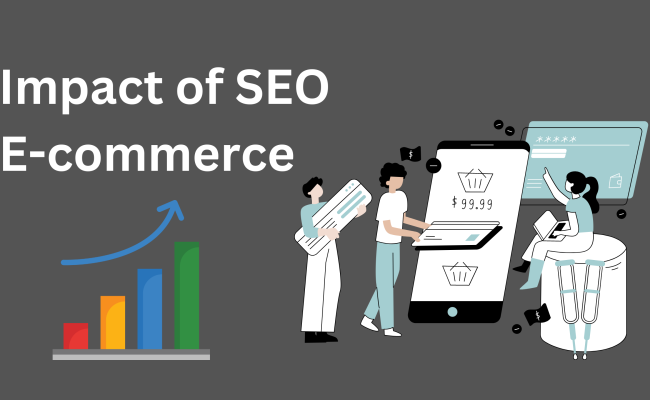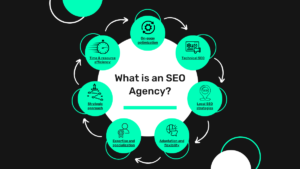Introduction:
In today’s digital age, e-commerce has become an integral part of our lives. With millions of online stores competing for attention, businesses must stand out and attract potential customers. This is where Search Engine Optimization (SEO) plays a vital role. In this article, we will explore the impact of SEO on e-commerce and how it can make or break an online business.
1. Organic Increased Traffic:
SEO is optimizing a website’s content, structure, and design to rank higher in search engine results pages (SERPs). E-commerce websites can increase their visibility and attract organic traffic by implementing effective SEO strategies.
When a potential customer searches for a product or service related to their business, appearing on the first page of search results dramatically enhances the chances of driving traffic to their website. Studies have shown that most users click on one of the top results on the first page. Therefore, achieving a high ranking in SERPs is crucial for attracting organic traffic.
Effective SEO strategies, such as keyword optimization, relevant content creation, and backlink building, contribute to higher search engine rankings. When a website ranks well for relevant keywords, it becomes more visible to users searching for those terms. This visibility translates into increased organic traffic as more users click the website link and visit the e-commerce store.
Moreover, SEO focuses not only on ranking high but also on attracting the right kind of traffic. By optimizing content and aligning it with user intent, e-commerce businesses can target specific keywords and phrases their potential customers use to search for products. This targeted approach ensures that the traffic generated through SEO is relevant and has a higher chance of converting into customers.
In summary, SEO is critical in driving organic traffic to e-commerce websites. By optimizing various elements of the website, businesses can increase their visibility in search engine results, attract more potential customers, and ultimately boost their online sales and revenue.
2. Improved User Experience:
SEO goes beyond search engine algorithms and focuses on enhancing the user experience. Users who visit an e-commerce website expect a smooth and seamless browsing experience. Optimizing website speed, mobile responsiveness, and user-friendly navigation is essential for search engines and users.
Website speed is crucial for user satisfaction. Slow-loading pages frustrate visitors and increase bounce rates. Search engines also consider page loading speed as a ranking factor, so optimizing website speed improves user experience and boosts search engine rankings.
Mobile responsiveness is another crucial aspect of user experience. With the increasing use of mobile devices for online shopping, e-commerce websites must be optimized for mobile viewing. Responsive design ensures the website adapts and functions well across different screen sizes, providing a positive user experience on smartphones and tablets.
User-friendly navigation is essential for helping visitors find what they’re looking for quickly and easily. Transparent menus, intuitive site structure, and superior search functionality create a positive user experience. When users can navigate a website effortlessly, they are more likely to stay longer, explore more pages, and make a purchase.
A seamless browsing experience enhances customer satisfaction and reduces bounce rates. When visitors have a positive experience on an e-commerce website, they are less likely to leave immediately (bounce) and more likely to engage with the content and products. This increased engagement can lead to higher conversion rates and improved business success.
3. Targeted Keyword Optimization:
Effective keyword research and optimization are fundamental to successful SEO campaigns. By identifying relevant keywords, e-commerce businesses can align their website content accordingly and improve their visibility in search results.
Keyword research involves identifying the terms and phrases potential customers use to search for products or services. This research helps businesses understand their target audience’s search behavior and intent. By incorporating these keywords strategically into their website content, companies can increase their chances of appearing in search results for relevant queries.
Optimizing various website elements with relevant keywords is essential for search engine visibility. This includes optimizing product descriptions, meta tags, headings, and URLs. By incorporating targeted keywords naturally within these elements, e-commerce websites send signals to search engines about the relevance and context of their content. This, in turn, improves the likelihood of ranking higher in search results for those specific keywords.
Targeted keyword optimization improves search engine visibility and helps attract high-quality traffic. When users search for specific keywords related to a product or service, they are likelier to intend to purchase strongly. By optimizing their website for these keywords, e-commerce businesses can attract a highly targeted audience likely to convert into paying customers.
In summary, focusing on user experience and targeted keyword optimization are crucial components of effective SEO strategies for e-commerce websites. By providing a seamless browsing experience and aligning website content with relevant keywords, businesses can improve their search engine rankings, attract high-quality traffic, and increase their chances of driving conversions and revenue.
4. Enhanced Brand Visibility:
One of the significant impacts of SEO on e-commerce is the improvement in brand visibility. When a website ranks higher in search results, it receives more visibility and exposure to potential customers. SEO strategies focus on optimizing various aspects of a website to achieve better rankings.
Consistently appearing in top positions in search results builds credibility and brand recognition. Users often perceive websites that rank higher as more trustworthy and reliable. As a result, e-commerce businesses that consistently rank well in search engine results establish themselves as authoritative players in their industry. This increased credibility leads to greater brand visibility and awareness among the target audience.
By investing in SEO, businesses can strategically align their website with the keywords and phrases that their target audience is searching for. This targeted optimization ensures that their brand appears in search results relevant to their products or services. The more frequently users encounter a brand in search results, the more likely they recognize and remember it. This repeated exposure contributes to enhanced brand visibility and recall.
5. Cost-Effectiveness:
SEO offers a cost-effective solution for e-commerce businesses to reach their target audience. Compared to traditional marketing methods such as print advertising or television commercials, SEO provides long-term benefits and a higher return on investment (ROI).
While paid advertising campaigns can yield quick results, they often require continuous investment to maintain visibility. On the other hand, SEO focuses on organic search traffic, which can generate sustainable results over time. By optimizing their website and content, businesses can attract organic traffic without relying solely on paid advertising.
Investing in SEO allows businesses to tap into the vast pool of potential customers who actively search for products or services online. These users are already exhibiting a certain level of intent and interest, making them more likely to convert into customers. By targeting these users through SEO, e-commerce businesses can reach a highly relevant audience and achieve better conversion rates.
Moreover, SEO provides long-term benefits as the optimizations made to a website continue to generate organic traffic even after the initial investment. Unlike paid advertising campaigns that end once the budget is depleted, SEO efforts can have lasting effects, leading to ongoing organic traffic and potential conversions.
In summary, SEO’s impact on e-commerce extends to enhanced brand visibility and cost-effectiveness. By improving search engine rankings, businesses gain greater visibility, credibility, and brand recognition. Additionally, SEO provides a cost-effective alternative to traditional marketing methods, delivering sustainable results and a higher return on investment over the long term.
Conclusion:
In the highly competitive e-commerce landscape, SEO has a significant impact on the success of online businesses. It increases organic traffic, improves user experience, targets relevant keywords, enhances brand visibility, and offers a cost-effective marketing solution. By investing in effective SEO strategies, e-commerce businesses can stay ahead of the competition, attract more customers, and achieve long-term growth and success in the digital marketplace.




